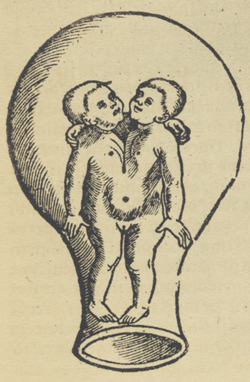 |
A drawing of conjoined twins in the womb from the book “Der Schwangern Frauen und Hebamen Rosengarten,” which was written by Eucharius Rosslin in 1513. The book is one of several rare medical texts that can be found in the McGoogan Library’s rare book rooms. |
The nearly 4,250 volumes in this collection, worth an estimated $3.4 million, were temporarily displaced following months of extensive renovations to the library’s two rare book rooms.
On Friday, UNMC students and faculty have been invited to tour the newly refurbished rare book rooms to see what makes this collection one of the best in the nation.
“Our collection isn’t the largest, but it’s unique because it includes works from nearly all of the ‘fathers’ of modern medical science,” said Nancy Woelfl, Ph.D., director of the McGoogan Library.
Dr. Woelfl describes the collection as a treasure trove of knowledge and discoveries which helped form the earliest — and most important — principles of science and medicine.
“Many of these volumes have beautiful illustrations in vivid colors. When you move from one century to the next, you can almost see the evolution of medical science,” Dr. Woelfl said.
Dr. Woelfl’s favorite in the collection is a rather small, thin volume from 1513, affectionately known as “Der Rosengarten” or “The Rose Garden.”
The actual title: “Der Schwangern Frauen und Hebamen Rosengarten,” which loosely translated from German means, “The rose garden for pregnant women and midwives.”
Written by Eucharius Rosslin, the book contains some of the earliest illustrations of a human fetus in utero. The fetus appears to be standing up, eyes open, peering inquisitively out from the pages. The figure is encapsulated in a shape representing the uterus, but resembling something more like a light bulb with the filament removed.
The illustrations show the baby in a variety of positions. One picture even shows conjoined twins.
It’s no surprise “Der Rosengarten” is said to have had a profound influence on the practice of midwifery for nearly two centuries.
Like many books from this period, the cover of “Der Rosengarten” was made of wood and the pages were made out of a variety of plant fibers such as hemp and cotton.
“Books made hundreds of years ago are remarkably durable and will last much longer than those printed today,” said John Schleicher, head of special collections at the McGoogan Library.
Schleicher’s favorite in the collection is a volume from 1798 by Edward Jenner about the author’s experience vaccinating humans against smallpox.
The oldest volume is from the 1300’s — a handwritten manuscript written by Albertus Magnus, the naturalist, scholar, and scientist, who was later known as St. Albert the Great.
Approximately 30 copies of the manuscript were produced in the 1300’s and more than 600 years later, UNMC owns one of them.
Protecting these rare books means carefully controlling the environment around them. Some of the renovations to the rare book rooms included:
- Installing a waterless fire suppression system
- Rerouting wet pipes and drains away from the rooms
- Installing new temperature controls, humidifiers and ventilation systems
- Redesigning ceilings and indirect lighting
- Adding updated security equipment
The majority of books in this rare and wonderful collection were donated by three former physicians affiliated with UNMC: cardiologist LeRoy Crummer, M.D., surgeon Robert Moes, M.D., and obstetrician/gynecologist Leon S. McGoogan, M.D.
Books in this collection cannot be checked out but the library does host rare book room tours.
To celebrate completion of renovations to the rare book rooms, UNMC will host a ribbon-cutting and presentation by Stephen J. Greenberg, Ph.D., coordinator of Public Services with the History of Medicine Division at the National Library of Medicine.
Dr. Greenberg’s talk, titled “Real Books: What They Are and Why We Still Need Them,” is open to all campus personnel, as well as the public. He will present in the Eppley Science Hall Amphitheater at 2 p.m. Due to limited space, the ribbon-cutting ceremony is by invitation only.
On Friday, the campus and the public are invited to tour the newly refurbished rare book rooms from 11 a.m. to 2 p.m.